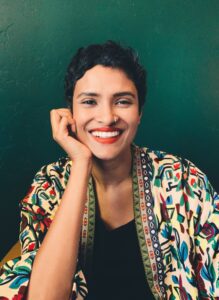
Chetna Mehta is a mixed-media artist, wellness consultant, and the creator of Mosaiceye, a platform that cultivates creative self-realization and embodied interconnection, particularly for self-identified women. Chetna harnesses the power of art and advocacy to foster creative liberation, mindful compassion, intentional living, and radical self-reflection. Her work thrives at the intersection of expressive healing arts, spirituality by way of ancient mysticism and mindfulness, and psychological education.
Mosaiceye offers local and engaging workshop circles, 1:1 consulting, and various online programs; all designed to create space for creativity, wellness, and community. The platform shares a wide set of resources for creative expression, visual inspiration, and empowered self and community care. To learn more about Chetna, CLICK HERE.
Welcome everybody, welcome to Spiritual Biz Chat for Spiritual Biz Magazine, and welcome Chetna Mehta! Thank you, Chetna, for joining us today, how are you doing?
CHETNA MEHTA: Thanks for having me. Today, I’m feeling spacious and grateful. I wind down my programming during the last couple of months of the year to allow time to prepare and vision for the new year. So I’m appreciating more free time lately to dream and rest.
It’s a pleasure to have you here, Chetna! Your spiritual consulting work is expressed largely through your unique art. Creativity can be game-changing for one’s mental, emotional, and spiritual health; and it certainly shows through your beautiful art pieces. How did you discover your artistic talents? And what is the story behind your personal journey down the path to your current life’s purpose and work?
CHETNA: My mother always nurtured my creative gifts, which as children, we all have. She encouraged me to draw, write love letters, and even journal out my nightmares. She always received what I made with excitement and invitation to continue. I’ve continued to rediscover my creativity as I’ve incorporated more introspective and reflection on my mental and emotional processes of creative practice; how it alchemizes my feelings and beliefs, and how I can see parts of myself more clearly.
How inspiring! Your spiritual work is largely about creative healing, about liberating and decolonizing people’s bodies and minds. What are some practices that you can suggest for dealing with our society’s limiting, hurtful standards, and norms?
CHETNA: Looking at the implicit and explicit meanings we’ve internalized of words like ‘creativity’, ‘art’, and ‘success’ are important ways to challenge them. The words we use not only affect but also sometimes limit our understanding and embodiment of them.
For example, the word ‘creativity’ means, according to the Oxford dictionary, “the use of the imagination or original ideas, especially in the production of an artistic work”. Pretty straight-forward, though implicitly, given words like ‘production’ and ‘original’, we might also subconsciously or blatantly believe that what comes from creativity needs to be monetized or a whole production in and of itself; or that it needs to be like nothing that already exists. The truth is, that we are all deeply influenced by resources around us in the past. When we question words like ‘original’, we might see that it’s more nuanced and gray.
Another practice I’d recommend is to give ourselves permission to do things, especially creative or fun things, badly. To move our bodies badly (or unlike any semblance of ‘dance’), to draw badly, to write poetry badly with no adherence to pre-conditioned rules. This is a form of liberation from the status quo that can affect our every line and move. We deepen into both the critical observation of internalized meaning of the words we use as well as practicing play and allowing ourselves to do things badly in a 3-month abundant creativity program.
These all definitely seem to be very helpful practices, thank you for them! With the coronavirus pandemic and all this current negative noise around us today, more and more people are turning to lightworkers in their search for peace and comfort, as well as realizing the importance of listening to their bodies and their needs. What are some ways to cultivate mind-body awareness and achieve body health and inner peace?
CHETNA: Given that emotions are fluctuating every minute of the day, I highly recommend, per my personal and professional experience, to leverage the feelings wheel; naming and acknowledging our emotions help us move through them and gain any feedback and wisdom from them. It’s especially helpful to non-judgmentally notice the sensations in the body associated with those feelings; to observe the heat, sweat, nausea, tension, etc.
We must then allow ourselves space and time to move through the cycles of those feelings with body movement, creative expression like singing, drawing or free-association writing, deep breathing, crying, or even screaming in a pillow (a favorite of mine)! These are all very effective ways to let the e-motion (energy in motion) move through and out of us.
Chetna, as the creator of Mosaiceye, can you share with us a bit about this platform and its purpose? Who is this platform for and how can your clients benefit from it?
CHETNA: Our mission is to cultivate creative self-realization and embodied interconnection, especially for self-identified women. We do this by leveraging mixed media art, education + radical self-reflection in community circle.
Self-realization is the process of gaining awareness, actualization, and fulfillment of one’s gifts and potentialities. Self-realization is an inherent drive and higher need present in each of us as humans.
Embodied interconnection is when we can thrive in our own bodies in their respective shapes, colors, and abilities while in sacred relation to our communities and the earth.
Self-identified women to us mean those who are 18+ years old and identify themselves as women, trans women, or femme. We particularly serve self-identified women of color who are wanting safe, affirming, and conscious spaces that address cultural & systemic dimensions related to their identities.

Community circle, where we sit, check-in, learn, and express together is significant in our mission; we strive to create more spaces where we can each be seen plus see one other with less colonial hierarchies or barriers.
What is your ultimate goal with your work? What is your mission? Your dream? What are some projects that are on your mind and that you are currently working on?
CHETNA: We strive to normalize our spectrum of emotions, increase emotional intelligence and awareness of our common humanity, actualize our individual and collective capacities for compassion and abundantly divine creativity.
Is there a final message you want to let our readers know? Or just any last little words that you have for them?
CHETNA: Wellness is not a state of being nor a destination to arrive at; wellness is a series of actions and an embodied practice. Wellness is ongoing and ever-evolving. We are all well in different moments and not so well in others; though we are always capable of cultivating and re-cultivating our well-being.
So beautifully said! Thank you, Chetna, very much! It has been such a pleasure chatting with you today!
CHETNA: Thank you very much.


